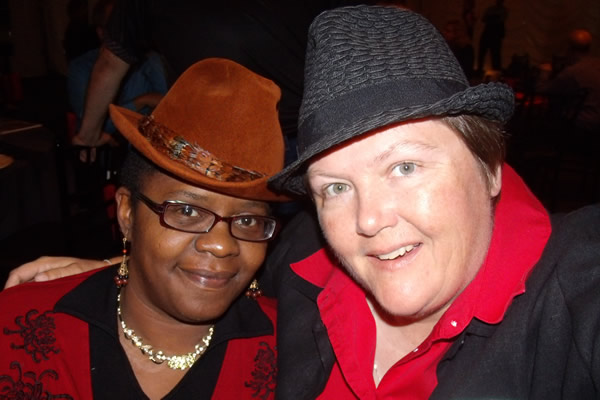News
Wisconsin latest state to face marriage lawsuit
‘Evasion’ statute prohibits couples from going elsewhere to wed


Charvonne Kemp (left) and Marie Carlson filed a lawsuit in Wisconsin seeking marriage rights. (Photo courtesy of the American Civil Liberties Union)
Same-sex couples in Wisconsin joined others throughout the country on Monday in filing a lawsuit seeking same-sex marriage, but efforts there are unique because of the penalties for marrying in another jurisdiction.
The litigation seeks not only to overturn the state’s 2006 constitutional amendment barring same-sex marriage, but also to enjoin state official from enforcing a “marriage evasion law” prohibiting couples — gay and straight — from going elsewhere to marry if the marriage would be prohibited in the state.
The penalties of violating the marriage evasion law in Wisconsin, which is the only state to have such a statute, include up to $10,000 in fines and nine months in prison.
For Marie Carlson, one-half of one of the couples participating in the lawsuit, the marriage evasion law is of concern as she seeks recognition of her relationship with Charvonne Kemp.
“It’s illegal in the state Wisconsin to go another state and get married if you live here,” Carlson said. “I know that it’s not really all that enforced; it’s still something that hangs over your head.”
The marriage evasion law is particularly problematic for same-sex couples in Wisconsin because the Obama administration in most cases has elected to recognize same-sex marriages even if the state doesn’t recognize them — provided these couples are able to marry in a jurisdiction that allows it.
John Knight, a staff attorney with the American Civil Liberties Union’s LGBT project, called the marriage evasion law a “Catch-22” for same-sex couples living in Wisconsin who want to marry.
“Wisconsin is unique in that sense, and so we think that argument particularly exemplifies the harm or the animus toward same-sex couples in some parts of the country,” Knight said.
But for Kemp, it’s not the fear of prosecution for marrying elsewhere that compels her to seek the right marry in Wisconsin, but the ability to wed in the state where she’s lived with her partner for seven years and raised two sons.
“We’re completely in love, and we’d like to be married in the state that we live in,” Kemp said. “We do have options where we could obviously leave the state and go to other states and get married, but we want to be legally recognized where we live.”
The lawsuit, Wolf and Schumacher v. Walker, was filed by the ACLU, the ACLU of Wisconsin and Mayer Brown LLP and is pending before the U.S. District Court for the Western District of Wisconsin.
Like other lawsuits filed throughout the country, the 29-page complaint filed by the groups in Wisconsin alleges the state’s ban on same-sex marriage violates equal protection and due process under the Fourteenth Amendment to the U.S. Constitution.
“Although Wisconsin and this country have taken some steps to reduce discrimination against lesbians and gays, Wisconsin’s ban on marriage for same-sex couples is a striking and continuing vestige of the long history of discrimination toward lesbians and gay men,” the complaint says.
The lawsuit was filed on behalf of four same-sex couples seeking to marry in Wisconsin. Along with Kemp and Carlson, who reside in Milwaukee, they are: Virginia Wolf and Carol Schumacher, who reside in Eau Claire, Wis.; Roy Badger and Garth Wangemann, who live in Milwaukee; and Judith “Judi” Trampf and Katharina “Katy” Heyning, who live in Madison.
Although Wisconsin offers same-sex couples the ability to join in a domestic partnership, enacted in the state in 2009, they don’t offer same the legal rights as marriages.
Carlson said the union isn’t enough because that union provides little assistance beyond certain health insurance benefits — and that’s only if the insurance company recognizes the partnership.
“It also goes along with the fact that last like year, Charvonne’s mother passed away, and we all had to go to New Jersey for a week,” Carlson said. “I had to use vacation time because…the company I work for didn’t recognize she was legally my partner, so I didn’t get bereavement to be able to go. So, I had to use a week of my vacation.”
The office of Wisconsin Gov. Scott Walker (R) didn’t immediately respond to the Washington Blade’s request to comment on the lawsuit.
Wisconsin Attorney General J.B. Van Hollen, however, pledged in a statement to the Blade that he would the defend the marriage amendment.
“This constitutional amendment was approved by a large majority of Wisconsin residents,” Van Hollen said. “I believe the amendment is constitutional, and I will vigorously defend it.”
The Wisconsin litigation is among 40 pending lawsuits in 22 states throughout the country seeking marriage rights for gay couples.
Amid expectations that one will soon reach the U.S. Supreme Court for a final ruling on marriage equality, Knight said it’s possible, but he wouldn’t bet on it.
“It’s one of the possibilities it might go to the Supreme Court, but the chance of that in light of all the other cases out there is probably fairly small,” Knight said. “But it could be.”
Nonetheless, if Walker continues to fight the lawsuit and a high court ruling doesn’t happen before the case is resolved, Kemp said she’s willing to take her case to the Supreme Court to fight for marriage rights across the country if necessary.
“I’m willing to go to the Supreme Court to fight for the right for everyone to be able to get married if that’s what they choose to do,” Kemp said. “It’s about marriage equality for all, not marriage equality for some, or for just us.”
For Kemp, the ability to marry in Wisconsin is not just about the legal rights that marriage would afford, but the dignity of having the access to the same union as other couples.
“However, I want to be married just like everyone else. I want it to be legal, not just for if one of us should get sick and having rights where we’re in the hospital with the other one, but also taxes, all the things that come with marriage, good and bad,” Kemp said.

The Mexican Senate on Thursday approved a bill that would ban so-called conversion therapy in the country.
Yaaj México, a Mexican LGBTQ rights group, on X noted the measure passed by a 77-4 vote margin with 15 abstentions. The Chamber of Deputies, the lower house of Mexico’s congress, approved the bill last month that, among other things, would subject conversion therapy practitioners to between two and six years in prison and fines.
The Senate on its X account described conversion therapy as “practices that have incentivized the violation of human rights of the LGBTTTIQ+ community.”
“The Senate moved (to) sanction therapies that impede or annul a person’s orientation or gender identity,” it said. “There are aggravating factors when the practices are done to minors, older adults and people with disabilities.”
Mexico City and the states of Oaxaca, Quintana Roo, Jalisco and Sonora are among the Mexican jurisdictions that have banned the discredited practice.
The Senate in 2022 passed a conversion therapy ban bill, but the House of Deputies did not approve it. It is not immediately clear whether President Andrés Manuel López Obrador supports the ban.
Canada, Brazil, Belgium, Germany, France, and New Zealand are among the countries that ban conversion therapy. Virginia, California, and D.C. are among the U.S. jurisdictions that prohibit the practice for minors.
The White House
Four states to ignore new Title IX rules protecting transgender students
Biden administration last Friday released final regulations

BY ERIN REED | Last Friday, the Biden administration released its final Title IX rules, which include protections for LGBTQ students by clarifying that Title IX forbids discrimination based on sexual orientation and gender identity.
The rule change could have a significant impact as it would supersede bathroom bans and other discriminatory policies that have become increasingly common in Republican states within the U.S.
As of Thursday morning, however, officials in at least four states — Oklahoma, Louisiana, Florida, and South Carolina — have directed schools to ignore the regulations, potentially setting up a federal showdown that may ultimately end up in a protracted court battle in the lead-up to the 2024 elections.
Louisiana State Superintendent of Education Cade Brumley was the first to respond, decrying the fact that the new Title IX regulations could block teachers and other students from exercising what has been dubbed by some a “right to bully” transgender students by using their old names and pronouns intentionally.
Asserting that Title IX law does not protect trans and queer students, Brumley states that schools “should not alter policies or procedures at this time.” Critically, several courts have ruled that trans and queer students are protected by Title IX, including the 4th U.S. Circuit Court of Appeals in a recent case in West Virginia.
In South Carolina, Schools Supt. Ellen Weaver wrote in a letter that providing protections for trans and LGBTQ students under Title IX “would rescind 50 years of progress and equality of opportunity by putting girls and women at a disadvantage in the educational arena,” apparently leaving trans kids out of her definition of those who deserve progress and equality of opportunity.
She then directed schools to ignore the new directive while waiting for court challenges. While South Carolina does not have a bathroom ban or statewide “Don’t Say Gay or Trans” law, such bills continue to be proposed in the state.
Responding to the South Carolina letter, Chase Glenn of Alliance For Full Acceptance stated, “While Supt. Weaver may not personally support the rights of LGBTQ+ students, she has the responsibility as the top school leader in our state to ensure that all students have equal rights and protections, and a safe place to learn and be themselves. The flagrant disregard shown for the Title IX rule tells me that our superintendent unfortunately does not have the best interests of all students in mind.”
Florida Education Commissioner Manny Diaz also joined in instructing schools not to implement Title IX regulations. In a letter issued to area schools, Diaz stated that the new Title IX regulations were tantamount to “gaslighting the country into believing that biological sex no longer has any meaning.”
Governor Ron DeSantis approved of the letter and stated that Florida “will not comply.” Florida has notably been the site of some of the most viciously anti-queer and anti-trans legislation in recent history, including a “Don’t Say Gay or Trans” law that was used to force a trans female teacher to go by “Mr.”
State Education Supt. Ryan Walters of Oklahoma was the latest to echo similar sentiments. Walters has recently appointed the right-wing media figure Chaya Raichik of Libs of TikTok to an advisory role “to improve school safety,” and notably, Raichik has posed proudly with papers accusing her of instigating bomb threats with her incendiary posts about LGBTQ people in classrooms.
The Title IX policies have been universally applauded by large LGBTQ rights organizations in the U.S. Lambda Legal, a key figure in fighting anti-LGBTQ legislation nationwide, said that the regulations “clearly cover LGBTQ+ students, as well as survivors and pregnant and parenting students across race and gender identity.” The Human Rights Campaign also praised the rule, stating, “rule will be life-changing for so many LGBTQ+ youth and help ensure LGBTQ+ students can receive the same educational experience as their peers: Going to dances, safely using the restroom, and writing stories that tell the truth about their own lives.”
The rule is slated to go into effect Aug. 1, pending any legal challenges.
****************************************************************************

Erin Reed is a transgender woman (she/her pronouns) and researcher who tracks anti-LGBTQ+ legislation around the world and helps people become better advocates for their queer family, friends, colleagues, and community. Reed also is a social media consultant and public speaker.
******************************************************************************************
The preceding article was first published at Erin In The Morning and is republished with permission.
South America
Argentina government dismisses transgender public sector employees
Country’s Trans Labor Quota Law enacted in 2021

Protests have broken out across Argentina in recent weeks after the dismissal of transgender people from their government jobs.
President Javier Milei’s action is in stark contract with the progress seen in 2023, where the government’s hiring of trans people increased by 900 percent within the framework of the Trans Labor Quota Law that had been in place since 2021.
Among those affected is Sofia Diaz, a “survivor” who shared her testimony with the Washington Blade hours after she traveled from Chaco Province to Buenos Aires to protest her dismissal.
Presentes, an LGBTQ news agency, reported the government dismissed more than 85 trans employees in less than two weeks.
Diaz, 49, holds a degree in combined arts. She joined the National Social Security Administration (ANSES) in 2022 under the Trans Labor Inclusion Law. The layoffs began in January and left many people feeling uncertain and anguished. It was her turn a few days ago.
Diaz in an interview recounted how the situation became progressively more complicated, with difficulties in accessing information about her employment status and the eventual confirmation of dismissals through WhatsApp messages. This government action, according to Diaz, violates the law.
“We were on a Friday, I think on March 24, in the office and we have a WhatsApp group of other colleagues from all over Argentina who entered through the trans labor quota and they tell us if we can get our pay stubs on the intranet,” Diaz recalled. “So, I tried to enter, I could not, I talked to two other colleagues and they told me no, they could not, and so we went to another person. He couldn’t either.”
“Some people told us that it could be a system error. Well, we were never calm, let’s say not how this issue of installing fear and the perversion with which they do it ends,” she added. “This sadism of … inflicting pain and speculating with your misfortune and so on … is something that characterizes Javier Milei’s government.”
Diaz recalled a list of those dismissed from the agency began to circulate from the union in the afternoon. A colleague passed it on to her, “and well, unfortunately I was also on that list.”
“At that moment the whole weekend went by with anguish, crying, and talking with other colleagues from other places, not only trans, but everyone, everyone and everyone,” she said. “On Monday when we went to try to enter, we could not enter with the biometric, which is the thumb we had to use every morning to enter.”
Despite the difficult moment through which she is going, the trans activist stressed to the Blade that she will continue protesting and will even sue the government because her dismissal is illegal and “violates the constitution itself.”
The LGBTQ community and its allies have mobilized and organized demonstrations, highlighting the importance of defending the rights won and fighting against discrimination and exclusion. Diaz emphasized the fight is not only for the people affected today, but also for future generations, saying the historical memory of the struggles for inclusion and social justice must be kept alive.
“The Argentine government thus faces a key challenge in human and labor rights, where public pressure and social mobilization can play a determining role in protecting the rights of LGBTQ+ people,” Diaz said.
-

 State Department4 days ago
State Department4 days agoState Department releases annual human rights report
-

 South America2 days ago
South America2 days agoArgentina government dismisses transgender public sector employees
-

 District of Columbia2 days ago
District of Columbia2 days agoCatching up with the asexuals and aromantics of D.C.
-

 Politics4 days ago
Politics4 days agoSmithsonian staff concerned about future of LGBTQ programming amid GOP scrutiny












